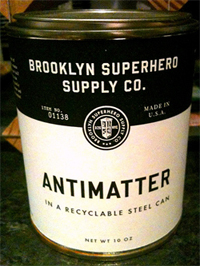Why Google Can’t Mix Matter and Anti-Matter: Keeping Organic Results Pure
 Think about this for a moment. Google is in both the Rankings and Advertising business. That’s a problem, because while both these activities shape opinion, they do so in mutually eroding ways.
Think about this for a moment. Google is in both the Rankings and Advertising business. That’s a problem, because while both these activities shape opinion, they do so in mutually eroding ways.
Advertising’s ubiquity and scale makes it a cultural role model. That’s the opposite of rankings, which get their power from a perception that they are an objective, authoritative view. Advertising may be expensive, but rankings need to be seen having a scarcity “beyond” commerce. That’s what makes them valuable.
SEO is Human Nature’s Reaction to Rankings
Once commerce gets tied up in rankings or scores, entire sub-industries spring up to help “optimize” results for clients. This isn’t unique to search, or the Internet. There are very few rankings that don’t have a revenue back door.
- Gartner’s Magic Quadrant and Forrester’s Wave inspire a big chunk of Analyst Relations spending, and occasional lawsuits from those who doubt the purity of analysts’ opinions.
- The New York Times Best-Sellers list gets gamed when followers of authors like Mitt Romney, L Ron Hubbard and others buy their books for the PR lift and legitimacy.
- US News and World Report’s university rankings have actually caused schools to change class structure and admissions strategy gain better scores.
- Even movie box office receipts are gamed for PR.
The Boston Globe recently asked me if Klout scores (a social media ranking) were valid and objective measures of social influence. I just laughed, because once the people who pay me believe a measure is valid, then it is in fact driving the influence which is most important to me.
There is no objectively valid way to rank social influence. Social influence is by definition a subjective thing. That said, any way you rank influence becomes valid – as soon as it creates market belief. Remember Second Life? It was valid and essential … until it wasn’t. Twitter wasn’t valid and essential … until suddenly it was.
The value of money is determined by what people believe it to be worth. So is social influence. And so are organic results. If people come to believe the rankings are based on tricks that Google is blind to, or that they turn a blind eye when their advertisers use such tricks, the value of Google’s results will decrease. And along with that decline, will be a decrease in value for the paid (PPC) results which are associated to them by their positioning on search engine results pages.
A perception of crappy organic results is a threat to the valued position of paid results, which is the lion’s share of Google’s revenue. Google must restore the authority and scarcity of organic listings, so they can be leveraged for AdWords.

 The future of digital experiences will be built by strategists who grasp the full array of emerging business, social, and technical models. Specialties in user experience, branding, application design, and data science are laying the foundation for richer user experiences and business models breakthrough products and revenue based marketing.
The future of digital experiences will be built by strategists who grasp the full array of emerging business, social, and technical models. Specialties in user experience, branding, application design, and data science are laying the foundation for richer user experiences and business models breakthrough products and revenue based marketing.
3 Responses to "Why Google Can’t Mix Matter and Anti-Matter: Keeping Organic Results Pure"
March 21, 2011
Google’s trouble with the reputation of its organic search opens up a weakness to a firm few see as its competitor, Facebook. If anyone will get social search right they will, and if they do, their audience will immediately make them a search powerhouse. Hey, Danny Sullivan, time to pay attention to Mark Zuckerberg as Sergey and Larry together.
April 1, 2011
[…] Seeks to Restore Integrity to it Search Results via Social Markers As I noted a few weeks ago, crappy organic search results are a threat to the value position of paid results. That’s the […]
September 8, 2020
My favorite place for fun with girls is on reife frauen bumsen so check them out